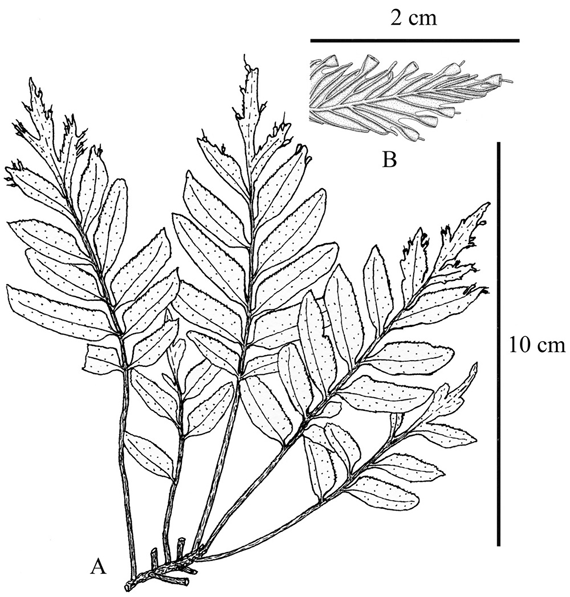Services on Demand
Journal
Article
Indicators
-
 Cited by SciELO
Cited by SciELO -
 Access statistics
Access statistics
Related links
-
 Cited by Google
Cited by Google -
 Similars in
SciELO
Similars in
SciELO -
 Similars in Google
Similars in Google
Share
Caldasia
Print version ISSN 0366-5232On-line version ISSN 2357-3759
Caldasia vol.31 no.1 Bogotá Jan./June 2009
ALEXANDER FRANCISCO ROJAS-ALVARADO
Escuela de Ciencias Biológicas. Universidad Nacional Autónoma. Apartado 86-3000, Heredia, Costa Rica. afrojas@una.ac.cr
ABSTRACT
I describe Tricomanes murilloanum A. Rojas a new species from Colombia. The new species is characterized by monomorphic fronds with only the apical pinnae pairs fertile. Additionally, Trichomanes egleri P.G. Windisch is reported as a new record for the country.
Key words. Trichomanes, Hymenophyllaceae, ferns, flora of Colombia.
RESUMEN
Se describe una nueva especie, Trichomanes murilloanum A. Rojas. La especie nueva está caracterizada por frondas monomorfas sólo con los pares de pinnas terminales fértiles. Por otra parte, Trichomanes egleri P.G. Windisch es registrada para el país.
Palabras clave. Trichomanes, Hymenophyllaceae, helechos, flora de Colombia.
Hymenophyllaceae is among the most diverse ferns families of Colombia with ca. 115 species and the genus Trichomanes s.l. is represented by 69 species (Murillo et al. 2008); but more collections and exhaustive revisions are expected to reveal more species.
Copeland (1938) divided Trichomanes into many genera, but for a long time, taxonomist treated the genus as an unit, because several traits such as translucent blade, tubular sori and exert receptacle made it readely identifiable. Recently, Ebihara et al. (2006), divided Trichomanes among eight genera based in molecular analysis: Abrodictyum, Callistopteris, Cephalomanes, Crepidomanes, Didymoglossum, Polyphlebium, Trichomanes and Vandenboschia; from which five are present in Colombia. This paper deals with a novelty in Trichomanes, distinguished by its restricted geographical distribution to the Neotropics (with one species in Africa) and chromosome base number, x=32 (Ebihara et al. 2006). The Trichomanes species mentioned in this work belong to subgenus Trichomanes that is characterized by membranous lamina texture with one cell thick and blade hairs at least in the veins and margin.
Trichomanes murilloanum A. Rojas, sp. nov. (Fig. 1).

TYPE: COLOMBIA. Caquetá: Municipio de Solano, Araracuara, camino a la represa, 21 Aug 1998, R. Alfonso & J. Tejada 299 (Holotype: COL; Isotype: COAH).
Novum pteridophytum hoc Trichomani pinnato simile, sed plantis rupicolis ripariis, frondibus monomorphicis brevioribus et stipite alato dignoscendum.
Epipetric; rhizome 1-2 mm in diameter, compact, ascending or decumbent, hairy, the hairs 1-2 mm long, atropurpureous to blackish, flat or cateniform, dense; fronds 5-16 cm long, sometimes with a cirro to 9 cm long additionally; stipe 2-4.5 cm long, 0.5-0.7 mm in diameter, yellowish to gray, winged in 1/2-2/3 of the apical portion, the wing less than 0.5 mm broad and gradually reduced toward the base, hairy, the hairs 1-2 mm long, simple, brown, deciduous, catenate; blade 3-8 x 1.5-5 cm, pinnate, lanceolate, truncate to scarcely reduced at the base, acuminate at apex, glabrous; rachis similar to stipe; pinnae 1-3 x 0.4-1.1 cm, oblong to oblanceolate, the basal ones free, the apical ones adhered in the basiscopic side, sometimes partially adhered in acroscopic side; costae sparsely hairy, the hairs 0.5-1 mm long; brown, catenate; veins 1-2-bifurcate, glabrous; sori 1-1.5 x 0.6-0.9 mm, short-tubular, exert, not winged.
Paratypes. COLOMBIA. Amazonas: Puerto Santander, Quebrada La Manchurria, 15 Aug 1998, R. Alfonso et al. 122 (COL, COAH). Meta: Serranía de La Macarena, margen izquierda del Río Guayabero, 10 km abajo de Caño Lozada, 550 m, 16 Jan 1959, P. Pinto & H. Bischler 193 (COL). GUYANA. Region: Potaro-Siparuni, Pakaraima Mountains, upper Ireng River, Orinduik Falls, 4º43'N, 60º02'W, 510 m, 23 Jan 1993, T. Henkel et al. 940 (COL, US). BRAZIL. Amazonas: Río Urubu, N of road, 20 Dec 1966, G. Prance et al. 3769 (COL, NY).
Etymology. This species is dedicated to María Teresa Murillo, Colombian Pteridologist, who is making important taxonomic contributions to her country.
Distribution. In the amazonian region of Colombia, Guyana and Brazil at 510-550 m.
This new species resembles T. hostmanianum (Klotzsch) Fée and T. pinnatum Hedw in having long stipe, pinnate and lanceolate frond blade with free basal pinnae only, but differs in its in relatively shorter (5-16 cm vs. (5-) 15-50 cm long) fronds; winged (vs. not winged) stipe, and monomorphic (vs. subdimorphic) fronds with fertile apical pinnae. Trichomanes murilloanum is characterized by its epipetric (vs. terrestrial in the former species) habit, growing in exposed areas on riversides or creeks (vs. understory). It resembles T. jenmanii Lellinger in size, but the new species has monomorphic fronds (vs. dimorphic).
NEW SPECIES RECORD
Trichomanes egleri P.G. Windisch, Bradea 4(2): 11 (1983). 1983. Type: Guyana, Mt. Latipú, P. Maas & Boyan 2651 (Holotype: HB; Isotypes: BRG, GH, NY!, U, Z).
Distribution. Amazonian lowlands of Colombia, Venezuela, Guyana and Brazil at known altitudinal distribution.
Material of new distribution: COLOMBIA. Amazonas: Puerto Santander, trocha a Monochoa por El Calvario, 24 Aug 1978, R. Alfonso & M. Fiagama 321 (COL); Río Igara-Paraná, Puerto Buenaventura (Hameau des indiens Witoto Jitomagaro), 25 June 1974, C. Sastre 3496 (COL), C. Sastre 3497 (COL).
ACKNOWLEDGMENTS
I thank Carlos Morales for the Latin translation of the diagnoses, the curator of the herbarium of the Instituto de Ciencias Naturales-Universidad Nacional de Colombia (COL), Luis Carlos Jiménez for allowing me to revise their specimens, to Julio Betancur for lodging me at his house and the anonymous reviewers for their helpful suggestions.
LITERATURE CITED
1. Copeland, E.B. 1938. Genera Hymenophyllacearum. Philipp. J. Sci. 64: 1-110. [ Links ]
2. Ebihara, A., J.Y. Dubuisson, K. Iwatsuki, S. Hennequin & M. Kito. 2006. A taxonomic revision of Hymenophyllaceae. Blumea 51: 221-280. [ Links ]
3. Murillo M.T., J. Murillo & A. León. 2008. Los Pteridofitos de Colombia. Biblioteca José Jerónimo Triana Nro. 18, Instituto de Ciencias Naturales, Universidad Nacional de Colombia. Bogotá, D.C. Pp. 197-218. [ Links ]
Recibido: 24/11/2008
Aceptado: 04/03/2009














